Dogs have great body language cues that can help communicate their thoughts and feelings to their owners.
These animals are highly intelligent and can form lasting bonds with their human companions, all through various forms of communication.
Dogs may make physical or vocal cues to let their owners know what they want.
 A dog resting its head in its owner’s lap seeks attention or food. Dogs also rest their head on their owner’s lap if they are upset, stressed, or attempting to protect their owner.
A dog resting its head in its owner’s lap seeks attention or food. Dogs also rest their head on their owner’s lap if they are upset, stressed, or attempting to protect their owner.
Not all dogs will rest their head, and individual dog personalities will dictate when and why the dog performs this action.
Owners who adore this may be concerned if the dog no longer performs this action.
A dog that suddenly stops resting its head in its owner’s lap could be depressed. Dog depression can come from an underlying medical problem or a chemical imbalance.
Once the source of depression is diagnosed, it can be easily treated with pharmaceuticals prescribed by the veterinarian.
Does My Dog Want Attention?
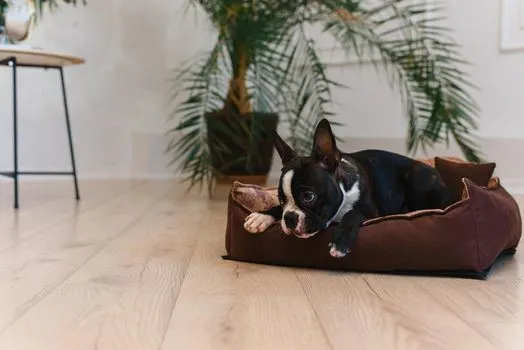 A dog resting its head on your lap is sure to melt your heart, and one of the main reasons for this behavior is that your dog is seeking attention.
A dog resting its head on your lap is sure to melt your heart, and one of the main reasons for this behavior is that your dog is seeking attention.
Dogs are very social and affectionate and look to their owners to provide a lasting bond.
When a dog places its head on your lap, it seeks your attention through a pet. Often, simply giving your dog a quick scratch or pet is enough to satisfy their craving for contact and attention.
What If My Dog Is Upset?
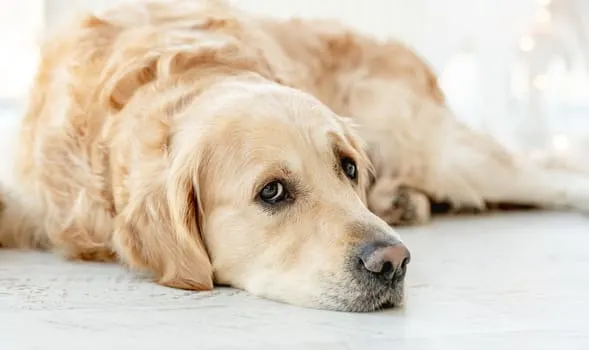 Sometimes a dog resting its head on your lap could indicate your dog is stressed. Dogs are social pack animals and look to you, their owner, as their pack leader.
Sometimes a dog resting its head on your lap could indicate your dog is stressed. Dogs are social pack animals and look to you, their owner, as their pack leader.
When your dog’s anxiety and stress level is heightened, it may come to you for help.
Resting their head on your lap is a cry for help in a stressful situation. Simply petting your dog’s head is enough to reduce your pet’s stress levels and assure your pet it is safe.
It can be challenging to determine if stress is the leading cause of this action. Look for other body language cues that could indicate your dog is upset.
Check your dog’s facial expression to see if it looks anxious. Your dog may also look agitated, pacing and moving its paws quickly.
If your dog makes audible sounds like whining or whimpering, it may be upset by something in the house.
Is My Dog Telling Me It Is Hungry?
 Dogs are wonderful communicators and opportunists. A dog resting its head on your lap while you are eating may simply be attempting to get some handouts.
Dogs are wonderful communicators and opportunists. A dog resting its head on your lap while you are eating may simply be attempting to get some handouts.
Your dog may smell what you are eating and be interested in scoring a bite.
Resting its head in your lap is a way for your dog to politely communicate that it would like some of your food.
Although this behavior is adorable, it can become problematic, especially if begging persists with each meal. To break your dog of this habit, you’ll want to enact some strict and consistent training.
Never reward your dog for begging by giving your dog food from your plate. Instead, get your dog to sit in a different area or even leave the room.
Feeding your dog before your meal can help reduce begging. Remember, consistency is vital when it comes to breaking this bad habit.
Is My Dog Trying To Stay Warm?
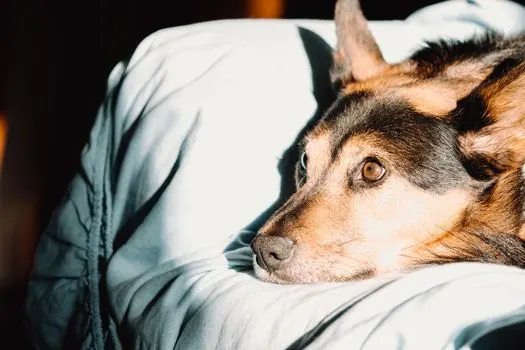 In the wild, dogs are pack animals and rely on each other for food, protection, and companionship. Dogs in the wild will also sleep together to preserve body heat and stay warm.
In the wild, dogs are pack animals and rely on each other for food, protection, and companionship. Dogs in the wild will also sleep together to preserve body heat and stay warm.
Although your dog has a thick and wooly coat, it may not be enough to keep it warm on cold nights.
Domestic dogs will perform this behavior at home and attempt to snuggle their owners to stay warm.
If your dog comes to you and rests its head in your lap, it may signify it is cold and trying to stay warm.
Dogs will usually perform this action at night, close to bedtime. If you don’t want to sit with your dog to warm it, wrapping it in a warm blanket can make it feel nice and comfortable.
Is My Dog Trying to Alert Me?
 Dogs will usually alert their owners to problems with a loud bark or growl, but sometimes, dogs intuitively know there is a problem.
Dogs will usually alert their owners to problems with a loud bark or growl, but sometimes, dogs intuitively know there is a problem.
A dog that rests its head in your lap may be trying to alert you to something.
A dog’s protective instincts will take over and rest its head on your lap to keep you safe.
Not all dogs will perform this action, depending on the dog’s personality.
How Else Will Dogs Alert Their Owners?
Because dogs cannot speak like humans, communication in different forms is key.
A dog will have to alert their owner for any number of reasons ranging from telling its owner it is mealtime to alerting its owner to possible danger from an intruder.
While some dogs will rest their head on their owner’s lap to alert them, other dogs will perform different behaviors including:
- Vocal Cues – Dog owners routinely report a range of different verbal cues from their dogs. Long howls will mean one thing, while short and choppy barks suggest another. Dogs may whimper or whine when upset or growl and snarl when they are fearful and sense danger.
- Pawing – A dog may try to alert its owner by pawing at its owner. A dog will take a front paw and routinely tap or hit their owner until it gets its owner’s attention.
- Nudging – Your dog may try to nudge you with its nose to push you toward a particular area of the home. A nudge from your dog is a physical communication tool to alert you to your dog’s needs.
- Eye Contact – When your dog is staring at you and refuses to break eye contact, it may be trying to tell you something.
- Panting – A dog that suddenly begins panting and anxious could be trying to tell you there is a problem and your dog needs your attention.
Why Doesn’t My Dog Rest Its Head In My Lap Anymore?
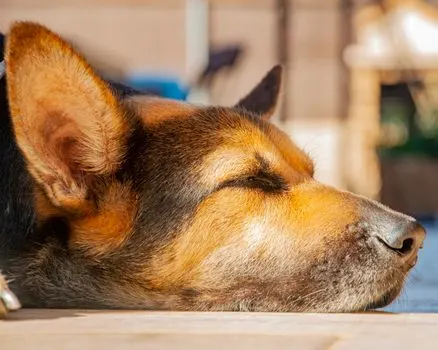 If your dog used to come to your side and rest its head in your lap but no longer performs this action, it could indicate a bigger problem.
If your dog used to come to your side and rest its head in your lap but no longer performs this action, it could indicate a bigger problem.
A dog that no longer seeks attention could be depressed. Other signs of depression in dogs include:
- Lethargy – Dogs that are depressed will have low energy and will no longer be interested in the activities they used to enjoy. Your dog may not want to play or refuse to go for walks.
- Weight Loss – A depressed dog often turns its nose up at food and prefers to sleep rather than eat. If you notice your dog is no longer eating or not eating as much, there is a good chance your dog is depressed.
- Aggression – Depression in dogs can sometimes take the form of unusual aggression. Dogs that are usually calm and mellow can suddenly become snappy and anxious. If you notice sudden and unexplained aggression, it could be a sign your dog is depressed.
- Vocal Cues – Sometimes, a depressed dog will give its owner vocal cues. A dog may howl or bark more than usual to alert its owner that it is depressed.
Treating depression in dogs can be difficult but possible. If an underlying medical condition causes your dog’s depression, your veterinarian will have to evaluate your dog for potential sources.
Veterinarian-prescribed pharmaceuticals can help treat dog depression wonderfully well and can help get your dog back to its normal, loving personality.
Related Questions
 Why does my dog like to sleep in my bed?
Why does my dog like to sleep in my bed?
Dogs constantly seek your attention and affection and will go to extreme lengths to be close to you. Many dog owners report having their dogs try to climb into bed with them to sleep for the night.
Although sleeping in bed is undoubtedly warmer and safer, your dog likes to sleep with you simply because it wants to be near you and loves you.
Dogs are pack animals and view humans as their pack leaders.
Sleeping together shows a strong bond and affection between you and your dog.
How can I stop my dog from begging?
A dog resting its head in your lap while eating could be begging for your food. This habit, although adorable, can become a nuisance behavior.
To try to prevent your dog from begging, resist the urge to feed scraps from your plate.
Instead, teach your dog obedience and reward only good behavior.
You can also send your dog to a particular space during mealtime or feed your dog before you eat to make sure it is full.
Related Guides
Our team is composed of pet care professionals, veterinarians, and pet owners. To date, we’ve conducted thousands of hours of research to publish the most accurate pet information.
Most of the writers on our site are vets with 10+ years of clinical experience, ranging from small practice, to equine practice, academia, and surgery. Our goal is to help every pet owner get the information they seek about their dear companions.

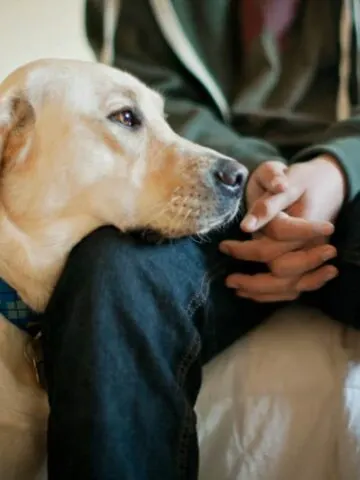

Leave a comment
You must be logged in to post a comment.